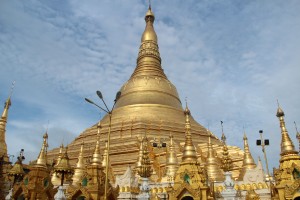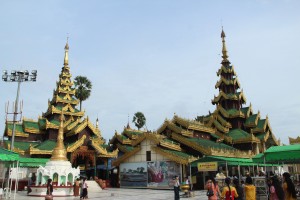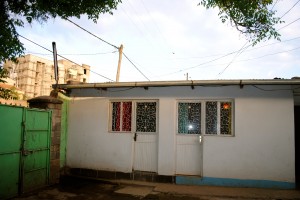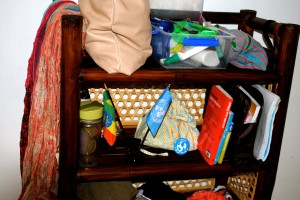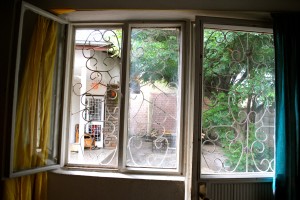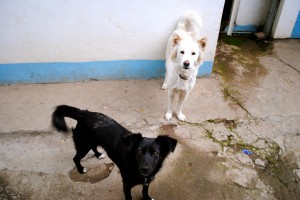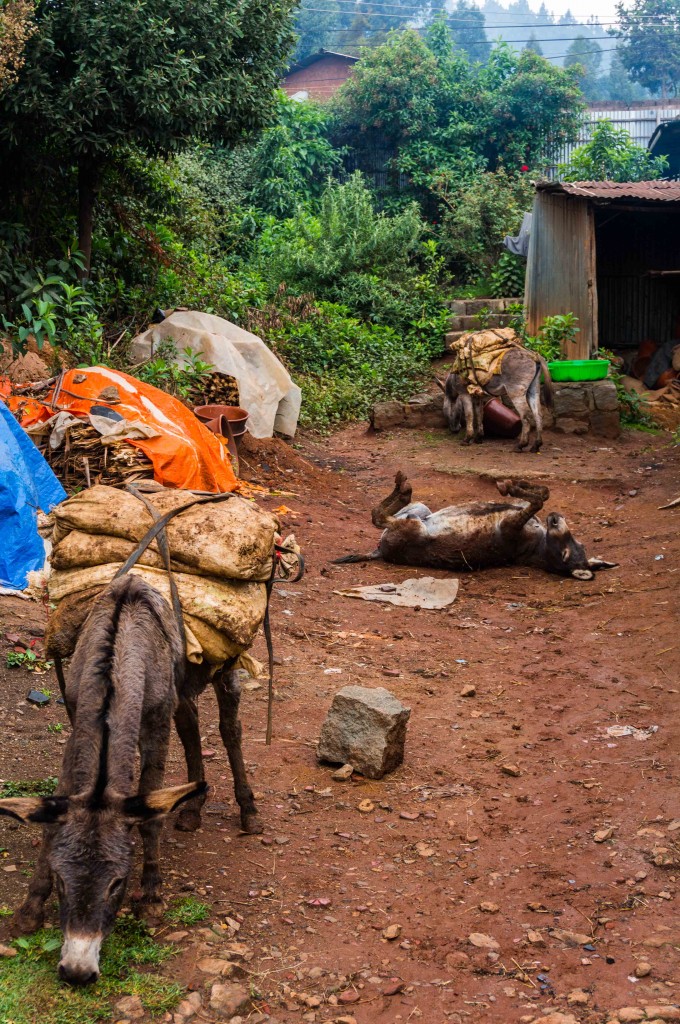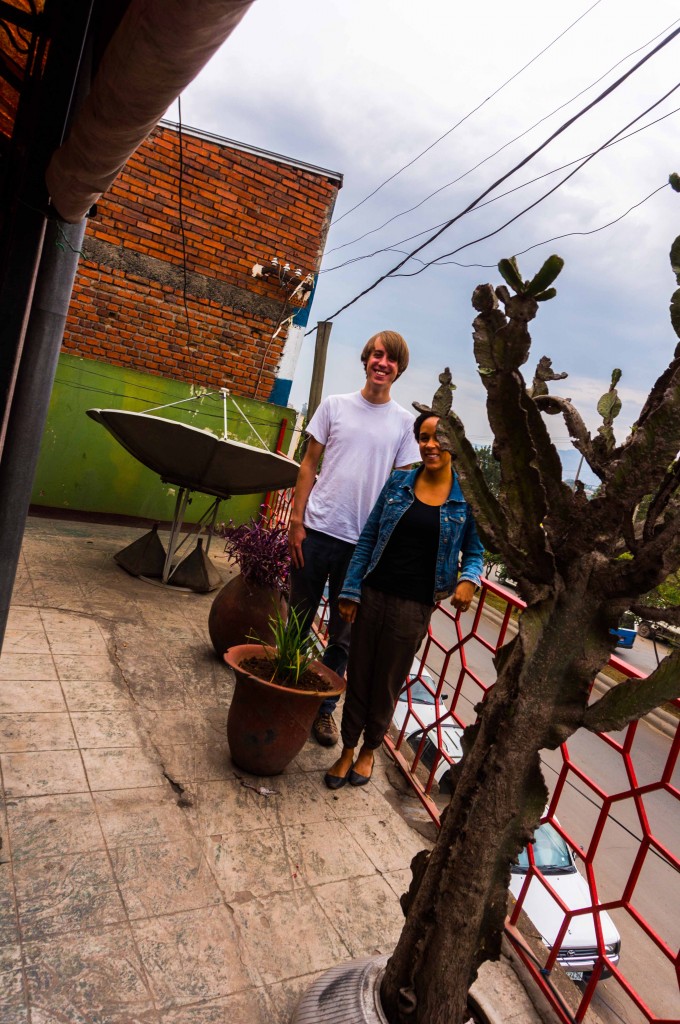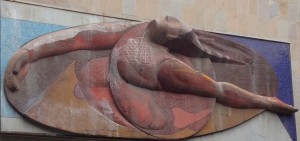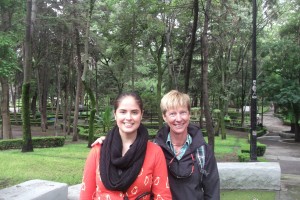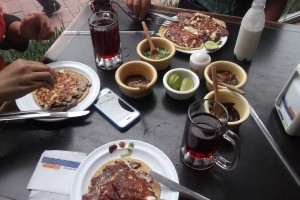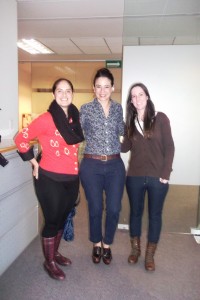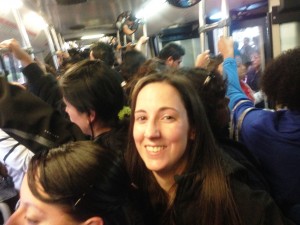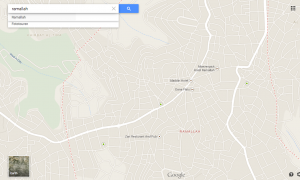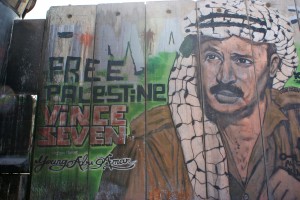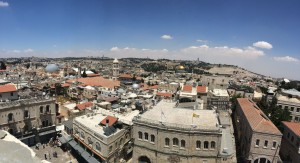Feeling blessed in Yangon
Posted by Namsai Wongsaeree in Burma, Namsai Wongsaeree on July 2, 2014
“We (I) will help you”
I have been told this sentence over and over again. Everywhere I found myself here in this beautiful city of Yangon, I got nothing but generous help. A kind of help that I would never have imagined of…
I have been working and receiving help from Burmese locals this past week. Sincere, caring, talented, trustworthy, and kind are the first adjectives that popped up in my mind when thinking of how to describe them. Surprisingly, this blog is, by far, taking me much longer than usual. I am not sure if I can do them justice in conveying how amazingly loving they all are.
Coming here not knowing anyone and having almost no proof of my identity, I had thought that building trust would be a difficult challenge. I can’t be more wrong. My premature assumption was clearly proved to be invalid.
A UNDP National Consultant trying to call and successfully connecting me with everyone he knows that works on water issues…
A retired pro-rector and an adviser on environment and education showing up in the guest house and taking me around to meet the people that he knows can help…
University professors agreeing to help with anything they can, from sharing their knowledge of the issue to directing me to the right people…
Senior engineers, consultants, and directors agreeing to take me along in the field, offering help with translation, and resisting my failed attempts to pay for my own breakfast, lunch, and snacks…and all agreeing that they now have a new “daughter”
A business owner coming to find me, offering her whole day (and potentially more days) taking me to meet with her friends who know of and experience water crisis, helping to find a translator for the VDO clips Janine and I had filmed in the dry zone…
A monk, a doctor, a reporter, and many individuals taking their time and patiently sharing me their stories and thoughts…
A local NGO calling and offering to come find me…
Meeting one person leads me to many more. Unexpected help is being offered.
Burma is an absolute definition of beauty. Beautiful country, beautiful culture’s’ (and I would like to stress my “s” here), and beautiful people.
I can’t be more thankful. I keep wondering what I have done to deserve all this.
“Are you Buddhist? In Buddhist, if you are good, the good thing will come to you”
Right. Now I will just have to live up to what has been given… Not easy.
Home
Posted by Katie Petitt in Ethiopia, Katie Petitt on July 1, 2014
Last Thursday I moved into my very own Addis home. I share it with 4 others: 2 are away on holiday, 2 dogs and a guard. It’s noting special, but it is nice to be able to unpack and cook for myself. I got a pretty good deal and will be paying less then $300 a month for the rent, a maid, dinner cooked for me every weeknight, and a security guard. I am happy with my find yet it still does not warrant $300 a month for two reasons: 1. While the water is fairly reliable (which is such a big deal!), the water pressure is hit or miss when it comes to the shower. Today was my first bucket shower in Ethiopia. 2. The more important issue is that my rent costs so much. As I said before I feel like I got a great deal but we should all keep in mind that the average person in Addis Ababa makes from $50-$100 a month. My rent is $300 and that is a great deal.
I am living in Bole, which is an expat haven, something that certainly affects the high price. Yet, the main culprit for the high living costs is inflation. Ethiopia has got it bad. A friend from Addis and I were talking the other night about inflation and he said that 6 years ago, you could buy 3 eggs for 1 Ethiopian Birr. Now, he said, you can buy 1 egg for 3 Ethiopian Birr. He told a story about how his cousin, who now lives in the US, used to love coming back to Addis. She thought it was heaven because with the money she made in the US she could buy so much here. Now she can get less for $100 then she use to. High inflation of course has greatly affected this country which was recently called the 2nd poorest country in the world by an Oxford University report. (Here OXFAM explains Oxford’s Index http://oxfamblogs.org/fp2p/measuring-what-matters-the-latest-multidimensional-poverty-index-is-launched-today/)
I would be wrong to blame all of the housing issues on the inflation, there are many reasons rental rates are so high, here are a few, yet they seem to all come back to inflation and good old supply and demand. Addis is the international hub for International NGOs working in Africa. The UN, African Union and countless embassies call Addis home. These organizations offer exuberant housing allowances for their employees. Most of these people are making dollars in a country where US currency goes along way (although not as far as it use to). All that, and needing to find a quick, easy, nice place makes people pay more in the ballpark of $2,000- $4,000 for a place that is definitely not worth that in Birr. Landlords know there is a constant stream of these employees who will pay these prices, so they keep their rents high, which then drives up the prices for the lower-range places like mine. A second reason is the boom in population Addis has experienced in recent years. Addis Ababa was founded as the capital in 1889-1891 and has only recently seen so many inhabitants. It just does not have the infrastructure to house so many people. Talking to people out and about you get a sense of how quickly the city is growing. I have asked many residents how many people live here and I have gotten anywhere from 2 million- 10 million people. A Google search will give you no current numbers, which may be why there is such confusion. Development is moving faster then the city is ready for and it is interesting to see.
A third reason for the highly inflated rents is because the government has been demolishing the slums. The administration is to provide government housing for displaced people, but in the mean time those who can afford other housing are desperate for shelter and will pay high prices while they wait. Rent prices keep increasing for many reasons. The rent prices are rising but the income of Addis residents in not necessarily doing the same. All of this is equals out to a tough housing situation here in Addis.
The last 2 ½ weeks have been very stressful without housing. As I walk along the roads of Addis I see all the men, women, boys, girls and elderly sleeping in the street or under a propped up tarp, I think about how much stress they must be under and how small my complaints are. I am no longer homeless in Addis Ababa, but many many many still are.
Our first interview
Posted by Allison Collender in Ally Collender, West Bank on June 30, 2014
Today has been stressful, exciting, humbling, and heartbreaking.
Lukas and I started off the day super early to travel to meet with the Jordan Valley Solidarity Campaign. It was a whirlwind of an adventure – we took the bus from Jerusalem to Ramallah, then another bus from Ramallah to Nablus, then a taxi from the Nablus bus station to the Nablus taxi station, then finally a shared taxi to Tubas, a small city outside Nablus. From there we met with two people from the Campaign, and we drove out to the Jordan Valley. (Stress – check!)
The Valley itself is absolutely gorgeous. Everywhere you look there are beautiful mountains, and it was nice being away from a city from a bit. Lukas and I both want to see as much as the region as possible, and I am so glad we had the opportunity to come here. I’ve always been more of a fan of mountains than the ocean, and even though it was incredibly hot, I loved this region of Palestine. (Excitement – check!)
To the untrained eye you wouldn’t think that water was such a big issue here. And from reports, water shouldn’t be an issue. If there’s one area within Israel and the West Bank that should have plenty of water, it’s the Jordan Valley. Yet, for the 60,000 – 80,000 Palestinians living in the Valley, water is a scarcity that is quickly driving people from the region.
We had the opportunity to meet with one family and get our first interview! This family was so incredibly welcoming, and didn’t even bat an eye when we rolled up to their home. There were two young girls, around the ages of 2 and 3, who were eyeing us suspiciously at first, but by the end of our visit we were able to get them to smile and high five us. Even though they were celebrating Ramadan, they made us lunch, and made sure we had plenty of coffee, tea, and water to drink. After being with them for over 2 hours, I was incredibly sad to leave, but so thankful for the opportunity to meet these wonderful people. (Humbled – check)
Unfortunately, the good vibes did not last very long. As soon as we returned home to Jerusalem, we learned that the bodies of the 3 kidnapped Israeli teens were found in a ditch north of Hebron. As of now, Lukas and I are keeping an eye on the news, and staying in Jerusalem until tensions die down. As always, we are hoping for the best for all parties involved. (Heartbreak… check…)
Oddities
Posted by Phoenix McLaughlin in Ethiopia, Phoenix McLaughlin on June 30, 2014
A donkey ran into me today. It did not simply brush or nudge me; it plowed into the side of my leg with force, and, dare I say, purpose. I was left physically unscathed by the event, but my view of the animal kingdom has surely been scarred by the donkey’s blatant disregard of decency.
I was standing on the sidewalk next to Katie as she attempted to buy guacamole ingredients from a fruit stand (and having a somewhat difficult time), unaware of the coming danger. Amid the normal din of street noise, I heard the familiar cry of “Hallo! Mister! Hallo! Sir!” It is something I hear at least ten times a day as various people try and get my attention either to sell me something or purely for entertainment. Today, it turns out, it meant that I was about to be struck by a donkey. A few seconds later, the donkey’s face ungracefully met my thigh and pushed me a few feet down the street. Everyone around—Katie, the shopkeepers, and especially myself—were surprised at first. But it did not take more than a couple seconds for the surprise to turn into laughter. The owner of the donkeys continued on down the street as if nothing happened, and soon enough we returned to buying food as if nothing happened as well.
A few days ago, Katie and I asked someone to take our picture at the request of our director, Pushpa. She needed a picture of the two of us in Addis to put online. We were at our old hostel, which has a balcony overlooking the street, and we asked one of the employees to take our picture. He immediately directed us to another one of the employees, implying that he was the true photographer of the bunch. Sure enough, once being shown the correct button to push, he moved around us snapping pictures at all angles. It looked like he pushed the button fifteen or twenty times, yet we later discovered he only managed to take three pictures. In all three, the large cactus near us featured prominently in the photo. Fortunately there was one in which the cactus only covered part of Katie’s head, so we used that one.
Most of the minibuses are covered in stickers of Jesus, Mary, or other Christian figures. I would estimate that about 90% of the stickers on minibuses are Christian, and that’s not that hard to understand, since a lot of people in Addis are very religious. The other 10%, however, are totally inexplicable. These stickers range from “Don’t mess with Texas” to “Power Steering”, but the most common non-Christian sticker is, without a doubt, the Apple logo.
You can’t explain that.
Unforgettable Interview
Posted by Namsai Wongsaeree in Burma, Namsai Wongsaeree on June 28, 2014
Today I had an interview that I would never forget.
My day started off with an unfamiliar sound of phone ringing disrupting myself from writing following-up emails to different organizations and people I had been meeting with this week. It had been a long week and I was glad to have an expected phone call, which led to an unexpected interview. I just recently rented a sim card and glad that it has proved to be very useful. Sim cards in Myanmar are very expensive, it costs 48 USD just to rent one for 15 days, and that doesn’t include any top-up packages…
The person calling was a student and a good friend of my ex-supervisor. We have been introduced to each other through emails and I knew him as a Burmese activist working on water issues. He offered to meet with me anytime within two hours. My gut was telling me that this would lead to something really important, without further hesitation, I jumped into a cab rushing off to see him.
Turns out that the person I met was nothing but ordinary. A graduate from Cornell, a writer, a long-term political activist, a first leader of the All Burmese Student Democratic Front (a student-led revolutionary group fighting against the Burmese government in 1988), a chairman of an NGO, a political prisoner…the list can go on and on…
Mr. Htun was tough, kind, and open. The kind of person who had been through unimaginable life struggles, yet still find love in humanity. The kind of person who had seen the worst sides of human beings, yet still believe in human dignity. He slowly talked me through his past, telling me how it was to be a revolutionist, how it was to get a death sentence and had to resettle in the United States, how it was to be separated from a family for years, how it was to spend five years in prison…
“Like animals.” was the answer I got. “I will never want to go to the zoo again, animals in those cages…”
Being maltreated by his countrymen doesn’t stop Mr.Htun from loving his country and the people. His NGO, the Civil Society for Myanmar (CSM), will be ready to run in the coming August. Mr.Htun is hoping to distribute drinking water to those in need.
I truly wish him success.
“Do you feel safe enough in your country?” “Can I share your stories?” I asked after he lightly told me about being followed by the Burmese intelligence agency.
“I am US citizen now. I don’t care. I just want to help people.” he simply answered.
Courage is among so many other things I learn from him.
ps. Thank you Leslie, my ex-supervisor, for making this happened and thank you, Htun, for the inspiration. 🙂
DOWN THE RABBIT HOLE
ARMS THAT AREN’T FOR HUGGING
HELPING HANDS THAT DON’T . . . or perhaps they do
(just not in the manner that I have so come to appreciate)
Words and their meanings
tumble
over
and
over
through space
as I try to get my bearings in this land of mind-altering juxtaposition.
It is the rare place, here, that I do not walk among armadas of men and their weaponry: on sidewalks, in train stations, crowding benches in drab colored rovers, caressing machine guns as they stand, walk and wait. The men with guns, it seems, never sleep.
On the opposite end of the gender spectrum, I have learned to attempt to blend into the pods of women clustered together in public places, so that they might go about their daily obligations without having to endure roving hands and suggestive glances. (In fact, Mujeres y Niños have designated spaces in trains and stations, evidenced by indelible signs, barricades, and guards that patrol the perimeters of these de-male-itarized zones.)
Paralleling, yet becoming too soon acclimated to existences that I could not have fathomed two days ago, I am enthralled by the rich art and history of this enchanting place, as well as by the sincerity and generosity of her people. They are passionate in their beliefs and commitments and more than willing to take time to share a story, a jugo, and help the Google-map challenged. The preparedness borne, apparently, of fear, fades into the backdrop of the daily tapestry of Life lived fully.
With a final juxtaposition for this day, I fortify myself for the fascinating work that lies ahead . . . . .
Welcoming a new Peacebuilder and my own problems with water.
Posted by Jessica Sanchez in Jessica Sanchez, Mexico on June 27, 2014
This week has proven an exciting and productive week. Amy Clark joined us from Colorado and we took a short trip down Avenida de los Insurgentes, a major avenue splitting D.F. into east and west. Overcast skies loomed above us, as cars zoomed by and we exchanged laughs about our experiences in arriving to D.F. We shared our first meal together of tasty rib tacos and salsas, green and red, to suit everyone’s palate. Though I’ve had plenty of tacos in my time here, it never seizes to amaze me how many different ways they can be prepared, tacos from Califa were delish. It felt like a meal with friends. Amy’s cheerful smile and vibrant personality quickly showed her to be a great addition to our little D.F. team. I’m very grateful to have her here for the next few weeks.
On another note, Ainhoa and I got to hear our first individual story on water issues. There’s more details about this encounter in Ainhoa’s blog, so I won’t repeat them, but I must share how phenomenal it felt to finally get to hear a real person’s experience about water issues in Mexico. All this time we’d been compiling organization contacts, using spreadsheets, sending emails, making phone calls; just for the chance to get to hear the real stories. Though it was short, it was worth it and now I feel like we’re on a roll. This one individual has connected us to another potential contact and we plan on meeting her soon. Thank goodness our work is paying off! Now that we’ve experienced our first story, I feel a bit more at ease.
Ironically, I had my own run-in with a water issue this very morning. I share an apartment in a large complex. On the bottom floor of by building is an elevator, two doors to exit the building in opposite directions, and a number of handwritten sheets of paper hung up to notify residents of bills that need to be paid or of upcoming events. I tend to ignore these notes because they usually don’t pertain to me. There was one particular note, however, that I failed to notice, but proved to be very relevant for me. On a white sheet, in big black marker was spelled out “homeowners, Friday, June 27th the cisterna will be washed, set water aside. Administration”. From what I’ve gathered, “cisternas” are tanks where water is stored to distribute either to a home or building. Since, our building’s cisterna is to be cleaned today, my roommates and I were suppose to set water aside. Unfortunately, it seems none of us took notice of it and I had just enough water to wash my face this morning! I came to Mexico to gather stories of the water issues residents face and I think today brought me a lot closer to understanding them, but also to appreciating how important water is in my daily life.
Our first water story after an exhausting day
Posted by Ainhoa Martinez in Ainhoa Martinez, Authors, Mexico on June 27, 2014
June 25th, we had a meeting with Mrs. Mara Hernandez (a specialist on water conflicts in Mexico).

Jessica and I spent half of the morning wondering around Insurgentes. It seemed like it had no end as it crosses the whole city from North to South.
Jessica and I felt a little bit lost among Insurgentes main avenue, Mrs. Hernandez was vague in giving us specifications about how to find her office, we might had the wrong address and Amy was in the city too, so we had to guide her in order to locate us among the huge avenue.
Surprisingly, Amy found the office and us in her first try to walk among the city alone. She is such an experienced woman with great skills and
I was impressed because I would not have been able to locate myself during my first day in the city without Jessica’s help. We were so happy to find her and got ready for our meeting.
The meeting went great and it was truly worth it. Mara helped us clarifying what kind of water problems are suffering people living in Mexico, she gave us different views about the conflict and provided us with some contacts which I am sure will be useful for us.
It was a wonderful coincidence that a woman working at Mrs. Hernandez’s office suffered from some water supply and shortages issues at her home and she felt comfortable in telling us her story. I felt glad we found our first story, but also concerned about this woman´s reality. Without water there is no life (in any extent, society level or location) and being able to empathize with people directly affected by water conflicts has given me a more human and real perspective out from the one I can take from the books or documentaries.
Coming back home was an adventure for us. We left Amy at the metro and Jessica and I took the metrobus, which is one of the fastest ways of travelling by public transport among Insurgentes avenue. Please check out my “pendeja face” while taking the metrobus, it was crowded and getting out of it could be described as giving birth to a crowd.
First field trip on the schedule
Posted by Lukas Matzkows in Lukas Matzkows, West Bank on June 27, 2014
As Ally said in her last entry we have been struggling to get in touch with people on the ground for the last weeks. Coming to country with only a handful of personal contacts and a culture so different from the one at home proved to be quite a challenge, but also a learning experience for us. However, the last few days make us feel more optimistic about the upcoming second half of our fellowship.
On Monday we met with a German hydrologist, recommended by one of my professors, who has been living in Ramallah since 1997 and is well connected in the field. Finding his office was a task of his own and what Janine said about Yangon is certainly also true for the West Bank. People give you the name of a street and you think, I will just type that into Google Maps. Well, think again, Google Maps has almost no street names in Ramallah and finding an address by yourself is nearly impossible.
After he gave us a detailed description and drew a map for us we managed to find him and he was happy to help. He established connections for us to the people of the Jordan Valley Solidarity Campaign (http://jordanvalleysolidarity.org/), who we will visit on Monday in the small community of Fasayel, north of Jericho. In this particular area, water should be available in abundance, yet it is one of the regions suffering the most from limited supply. According to a survey of Save the Children UK, only 37% of the inhabitants have regular access to water resources
(http://www.savethechildren.org.uk/sites/default/files/docs/English_Jordan_Valley_Fact_Sheet_and_Citations.pdf).
It will be our first proper visit to the field and Ally and I are very excited, but also anxious about meeting people directly affected by water restrictions and shortages.
As Ally announced yesterday, in addition to the contacts established, we chose to have a change of strategy, away from e-mailing dozens of organisations that do not answer, towards a more direct approach of simply walking into their offices. We tried that strategy yesterday in Ramallah. and were not very successful. Of the two organisations we tried to meet, one said they cannot help us and at the other one nobody was there. Luckily, when we were about to leave Ramallah disappointed, Palestine showed itself to us from its best side again, in the form of its people. Ally and I decided to walk to the checkpoint, because we were more or less in between Qalandiya and the bus station and all busses that passed by were too full to take us. After walking for a while we heard constant honking behind us and saw a man in his lorry waving at us. His name was Hatem and he insisted to take us to the checkpoint. Although he hardly spoke any English and a conversation with our rudimentary Arabic was not really possible, we learned some things about him, exchanged phone numbers and saw again how kind and warm hearted the people of this country are.
Rethinking our strategy
Posted by Allison Collender in Ally Collender, West Bank on June 26, 2014
It’s been pretty difficult establishing contact with organizations or individuals in Israel and the West Bank. Lukas and I have reached out to so many organizations (at least 40 so far) that somehow deal with water issues, and only a small handful of those have replied. An even smaller amount has offered assistance. Needless to say, it’s been a little frustrating. There are so many groups affected by water, and there are so many problems surrounding water itself. People in East Jerusalem have a very different story than those who live in Area C in the West Bank. But the core issue is that many people aren’t receiving enough water. We’ve been told multiple times that there are 2.6 million people in the area with water issues. So where do we begin?
So, now we are back to square one, kind of. We’re going back through the list of organizations that we’ve contacted, and are planning on showing up to their offices and asking to speak to someone. The worst they can say is no. But with the organizations spread out over Ramallah, Bethlehem, Hebron, Jerusalem, and Tel Aviv, it’s a little difficult. And finding street addresses in the West Bank is nearly impossible. But we’re slowly working through it all and I feel confident with the direction we’re going. Regardless of what happens, at the end of this journey I will walk away having learned a lot about research, the Israeli-Palestinian conflict, and most importantly, myself.
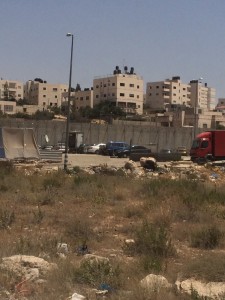
A picture from one of our adventures traveling into Ramallah. The concrete wall separates Israel from the West Bank.
Even though we’ve had some bumps in the road, we have had some good news as well. Lukas will be writing a blog post in a little bit sharing some of our successes.
